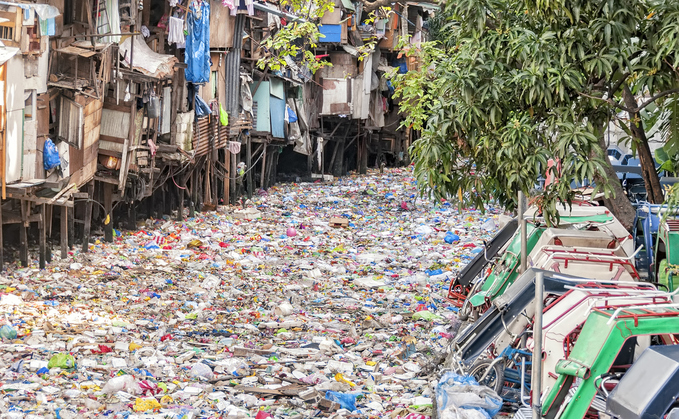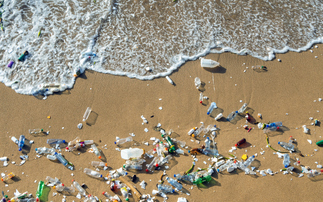
Hopes are high that countries can next week agree to drawing up a global plastics treaty | Credit: iStock
With countries set to discuss potential blueprint for a Paris Agreement-style treaty for tackling plastic waste this week, leading experts give their views on what it should look like
If designed well and properly adhered to, global treaties have a lot going for them.
The Paris Agreement on climate change, signed into life in 2015, may not be perfect. COP talks each year are often fraught and progress remains far too slow, as today's IPCC report on escalating climate impacts will testify. The US left the treaty altogether briefly. Emissions are still rising. And it remains to be seen if recent pledges to accelerate climate action can survive the geopolitcal crisis unleashed by Russia's Vladimir Putin. But no global UN process which aims to take into account the competing views and interests of almost 200 countries in order to try and to solve the greatest challenge humanity was ever going to be plain sailing.
Yet in the six years since its birth, the Paris Agreement has undoubtedly transformed policy, investment, and economic thinking. Over 90 per cent of global greenhouse emissions are now covered by net zero targets, and key clean technologies such as wind, solar, and electric vehicles are rapidly disrupting polluting industries and driving down growth projections for fossil fuel demand. The world already looks like a very different place to 2015, and the Paris Agreement has a strong claim for striking the match that lit the touchpaper on the net zero transition. As close observers of global climate diplomacy have long argued, if the COP process and the Paris Agreement did not exist you would have to invent them.
So could such a treaty ever work in the same way for another, interconnected, cross-border environmental crisis facing the planet: plastic pollution?
Something certainly needs doing to combat the problem at an international level, and urgently. Deeply concerning data released last week by the Organisation for Economic Co-operation and Development (OECD) set out in stark detail just how serious the plastics crisis is, and underscored how there is scarcely a single aspect of our lives of area of the planet that is not impacted. Global plastic production has doubled over the past two decades, and global plastic waste has similarly doubled, to the point where is estimated the world is generating plastic waste equivalent to the weight of 100 Eiffel Towers every single day, according to the OECD.
Fortunately, more than 160 countries are thought to be broadly in favour of designing a global plastics agreement of some sort, and the issue is set to be high on the agenda at the UN Environment Assembly when it gathers in Nairobi this week. Hopes are therefore high that countries will agree to start the ball rolling on greater international coordination over the problem, and potentially even set out a blueprint for a plastics treaty.
"It is pretty obvious that current policies are not yet matching with the magnitude of the challenge," said Carsten Wachholz, senior policy manager at the Ellen MacArthur Foundation, as he sought to set out the scale of the crisis last week at a virtual roundtable hosted by Hill+Knowlton Strategies and chaired by BusinessGreen editor James Murray.
"Plastic pollution increasingly contributes to the climate and biodiversity crisis, so the cost of inaction increases basically year by year due to negative health, social and also economic impacts," he added. "Governments industry and civil society will have to work together towards a common understanding not only of the root causes of the problem, but also agree on a shared approach to address it.
"There are probably 150-180 countries which say in principle they want this. It's just a question of how do we get started - how do we organise the process of negotiating a new multilateral environmental agreement?"
It is important to stress that if a global treaty to halt and reverse the plastic waste crisis is ever to come to fruition, the best that can be hoped for at the UN Environment Assembly next week is for countries to first agree to start talks on drawing up such a treaty. What such a treaty should look like in practice remains very many steps further down the line.
But for Wachholz, there are some clear priorities for the design of any such treaty. Firstly, and perhaps most importantly, it should be legally-binding to some degree, as voluntary commitments will not cut it, he argued.
"A legally binding UN treaty to address plastic pollution will amplify existing voluntary initiatives and create a level playing field for an industry that operates along global value chains," he explained. "And an international agreement must provide a robust governance structure to ensure that all countries can participate and finally comply with the targets that they have been set.
But he also argued that whatever emerges should not look quite the same as the Paris Agreement, which sets out a long-term aspiration to limit global warming to 'well below' 2C with 1.5C the optimal goal, which necessitates deep emissions cuts in the 2020s and net zero by 2050.
"I think if there's one lesson to learn from that approach, it is that we should not repeat that exactly the same for plastics," he said. "It is not enough just to set an aim for, say, zero plastic leakage into the environment. Everybody would sign up to that. It's really about designing a roadmap for governments to embark on the journey wherever they are currently. There are basic things we need to fix in terms of major leakage, which not only causes environmental but also economic problems for those countries. But then it's all about creating incentives - how do we move towards more circularity? The power of realigning incentives which are currently incentivising our linear, make-waste system would actually help businesses in those counties to seize more new business opportunities."
In short, a global treaty solely focused on downstream end of plastic pollution, such as better waste management infrastructure worldwide, does not solve the problem on its own. There is a need to focus on the upstream side too, which means better product and packaging design and tackling behaviours and systems which create waste in the first place.
Greater harmonisation on regulations and waste principles would help here, and this should also be core to any treaty process, according to Kristin Hughes, director of the Global Plastic Action Partnership Programme at the World Economic Forum (WEF), who also spoke at the event.
"Currently all governments are setting very different kinds of targets on plastic pollution, and they're not really talking to one another," she said. "To the treaty should certainly allow for binding approaches to commitments, help governments and others to take tangible action, help track progress against those commitments, and hopefully help the world to actually get on course towards zero plastic pollution, much like the Paris Agreement's [goal for] net zero on climate."
More specifically, Hughes said she hoped for a global plastics treaty that sets out rules for production, use and disposal of plastics, as well as for the collection and recycling of plastics downstream.
"You see these ideas growing in support from businesses and governments because there really is a big need to harmonise an approach both upstream and downstream for what is truly a global epidemic," Hughes added.
Indeed, business support for a plastic treaty will likely be crucial, just as it was in helping to get the Paris Agreement over the line in 2015. Fortunately, there is mounting evidence of businesses recognising the opportunities presented by a more circular economy for plastics.
Also speaking at the event was Christina Niemelä Ström, supply sustainability manager at IKEA, which has set an ambitious goal to be a '100 per cent circular' business by 2030. She pointed out that more efficient resource use is hugely beneficial for businesses, in terms of cost and time savings, as "we can get our hand on all those resources that are just lying out there, and then get it back into the flow".
"So I would say that as a business, at least from our side, we see that this is also a business opportunity," said Ström.
But achieving its 2030 target is no easy feat. It will mean ensuring that every single one of IKEA's products is completely circular from the beginning, by using only renewable or recycled materials, and developing circular capabilities in its supply chain. It starts at the design phase, and goes right through the entire lifecycle of a product, Ström explained.
"It's not only about plastics - we use our circular design principles, and we need to look at every product," she said. "We've assessed all 9,500 products in our range to see how they are doing, to know what we need to move, and that's when you start to take the choice of what material."
Firstly, there is the decision about whether is needed at all, and if so which type to use, then finally how it can be reused, refurbished, and recycled. There are trade offs to consider too, though, such as availability and functionality of materials, and the differences between materials in terms of both financial and carbon costs.
Designing out waste is far from a linear, smooth process, which is precisely why IKEA cannot tackle the plastic waste problem alone. More coordination between governments and businesses can unlock better data on impacts from materials, which can in turn aid better decision making, Ström argued. "That's also why I think a global treaty will be good, because we can actually aggregate data much faster by doing this so that we can get into fact-based decisions," she said.
Even so, drawing up a business case for investing in the myriad waste management, circular design, and more eco-efficient materials in the current landscape remains a challenge for many firms, particularly if any potential plastics treaty that could set the parameters for more effective national policies is still some way off.
As David Clark, vice present for sustainability at food, beverage, home and pharmaceutical packaging company Amcor, pointed out at the event, the market incentives are all pointing the wrong way at the moment, and an effective treaty must try to address that. After all, in many parts of the world it remains far cheaper to either landfill or simply dump waste altogether compared to the cost of repairing or recycling materials, or indeed investing in more circular design and better waste management infrastructure.
"We operate in 40 countries around the world not only with plastics, but with paper, metals and other materials," Clark explained. "And I can tell you in every country that does have a good circular solution - whether it's recycling or reuse or others - there are two things: there's sound government policy, and there's a funding mechanism, because all of these [processes] cost more than the materials are worth that come back. And the only way that will happen is if we have government involvement and government support in a framework."
As with climate change the need to tackle the fundamental market failure that leads to pollution is paramount. "A big part of what we have to do is realise there are costs associated with extracting natural resources," Clark added. "There are costs associated with pollution or loss of those resources, and if we internalise those that enables the circular economy principles that we're talking about."
Extended producer responsibility regulations can help force producers to have a stake in the disposal or reuse of their waste, which can then in turn drive up investment in more circular design principles, as well as waste management infrastructure, Clark argued. "Businesses, and especially the leading companies, are now committing to design all of the packaging so that it will fit into a circular economy," he said. "Many of the big global brands and others have committed to making their packaging recyclable or reusable or compostable by 2025. Now, the infrastructure may not yet exist, but that's a key enabler that is also going to help with the economics of creating a circular economy."
As Hughes pointed out, the private sector cannot always rely on getting the right regulatory support, funding and market signals to make the changes that are needed. But there are important ways in which businesses can help make progess all the same. The WEF's Global Plastic Action Partnership - which counts the likes of the Coca-Cola Company, Nestle, and Unilever among its backers - recently published a financing toolkit aimed at highlighting different opportunities for businesses to invest in tackling plastic waste and building circular economy processes. It demonstrated there are major firms around the world today which are developing circular economy models that deliver a return on investment, such as Coca-Cola's investment in PET plastic recycling facilities in Mexico, for example.
"Whilst right now I think there's still a bit of a dearth in true practical investments in circularity, we're very hopeful about some of the some of the case studies we've shown," said Hughes. "There are I think huge opportunities, we're just not quite there yet."
If countries next week agree a global plastics treaty is the way forward, and work towards its design begins, then it will be a huge win for global efforts to build a more circular economy, sending a clear signal to governments, investors, and businesses that bolder policies are on the way to tackle inefficient resource use, polluted food and water, and the associated carbon emissions from plastic production.
However, as the Paris Agreement has shown, international treaties are not a quick fix for environmental problems. A handful of powerful countries are likely to be highly resistant to any new agreement that could curb plastic production, especially when large parts of the oil industry are betting on expanding demand for plastic and petrochemicals to justify investment in new infrastructure as electric vehicles start to take a bite out of demand for transport fuels. It is therefore incumbent on businesses to ramp up efforts to align themselves with circular economy principles, regardless of what happens this week in Nairobi.
There is certainly growing demand to do just that - more than 70 global companies have signed a letter led by the Ellen MacArthur Foundation calling for a robust, legally binding treaty on plastic pollution and many others have made resource efficiency a key part of their new net zero strategies. There is evidently pressure for action from investors too, given that some of the names signing that letter are major financial institutions with the clout to press their assets and customers towards greener, more circular practices.
As such, against a remarkably bleak geopolitical backdrop countries this week have an huge opportunity to accelerate work to tackle plastic pollution and lay the foundations for a potential treaty. "This is just the beginning," said Hughes. "But we're really looking forward to working with governments and companies in this journey to address plastic waste and pollution through the delivery of a meaningful treaty."
The webinar - ‘Is a UN treaty needed to solve the plastics pollution crisis?' - was hosted in partnership with Hill+Knowlton Strategies. You can watch back the entire discussion here.









